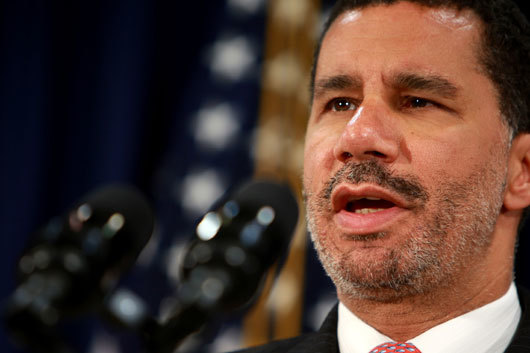Shortly before departing the Governor’s Mansion for good, outgoing New York Governor David Paterson (D) vetoed a legislative moratorium on natural gas drilling permits utilizing hydraulic fracturing techniques—but then issued an alternate moratorium of his own.
Fracking Put on Hold
On December 13, Paterson vetoed a bill passed by the state legislature that would have prohibited New York’s Department of Environmental Conservation (DEC) from issuing new drilling permits for hydraulic fracturing. The moratorium was to last until May 15 of this year.
He then issued an executive order imposing a moratorium on permits for horizontal wells and instructing the DEC to revise its draft of standards governing the use of high-volume fracking. The revision is to be completed no later than June 1, 2011 and will include public comment and perhaps hearings.
The move is expected to sharpen the controversy over hydraulic fracturing, or “fracking,” a technology that allows for the efficient and cost-effective extraction of underground natural gas deposits. Fracking entails high-volume injection of water, sand, and trace chemicals to release natural gas tucked away in shale, or soft rocks.
Natural Gas Production Rising
In recent years, fracking has been combined with horizontal drilling. These techniques, combined with rapid technological advances, have enabled natural gas production in the United States to increase dramatically during the past decade. The most promising U.S. shale formation is the Marcellus region, which stretches across much of the east-central United States, including upstate New York.
Although shale gas production promises to lower U.S. energy prices, sustain well-paying new jobs, and bolster state tax revenue, environmental activist groups claim fracking jeopardizes groundwater quality.
Punting to Cuomo
In effect, Paterson put fracking on hold for several months and left the issue up to the state’s new governor, Andrew Cuomo (D), to resolve. During his successful gubernatorial campaign, Cuomo said he favored using fracking to get at natural gas as long as it was “safe,” but he never explained what he meant by the word.
Most environmental activist groups applauded his move.
“Governor Paterson has signaled that he understands that fracking is a dangerous process that poses serious health and environmental threats,” said a press statement released by several environmental activist groups. “The moratorium makes New York the first state to insist on protecting the health and safety of the citizens and drinking water before allowing drilling to proceed.”
Groups signing the statement included the Catskill Citizens for Safe Energy, Citizens Campaign for the Environment, Catskill Mountainkeeper, Earthjustice, Environmental Advocates of New York, Hudson Riverkeeper, Natural Resources Defense Council, and Sierra Club–Atlantic Chapter.
Ticket to Prosperity
Facing rising unemployment, a growing state budget deficit, and declining population in rural areas of the state, many upstate New York residents see natural gas as a ticket to prosperity. They point to neighboring Pennsylvania, where drilling in the Marcellus Shale has brought rural communities back from the brink of economic extinction and replenished the coffers of cash-strapped local governments.
“This moratorium will drive out those rural landowners who have struggled for years to eke out a living off the land, who are barely hanging on in these difficult economic times,” said Karen Bulich Moreau, president of the NY-based Foundation for Land and Liberty.
“I have visited many of the farms in the southern tier, which are often fourth or fifth generation in the family,” Moreau noted. “Some of them were fortunate enough to sign leases with gas companies before the environmentalists pressured the legislature and Gov. Paterson to shut down hydro-fracturing. They invested monies from their leases back into their farms, saving them when milk prices were at all-time lows. Those subject to the moratorium stand to lose their land to debt, without the extra cash these leases could provide.
“It is a travesty that many of those who are land-rich and cash-poor will lose their land in foreclosure,” Moreau explained. “Who will purchase the land at auction and be able to hold on to the land until the moratorium is lifted? My guess is the purchasers won’t be farmers. So much for environmentalist slogans about preserving open space.”
Bonner R. Cohen, Ph. D. ([email protected]) is a senior fellow at the National Center for Public Policy Research in Washington, DC.





